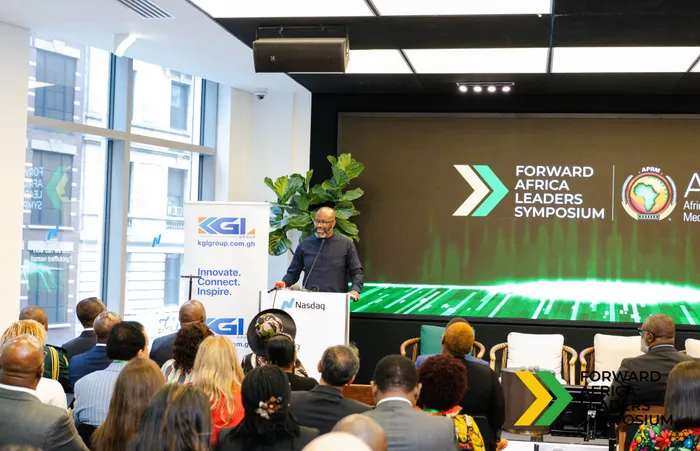MTN’s Ralph Mupita urges Africa to seize digital moment at UN sidelines forum

MTN Group President and CEO Ralph Mupita speaking at the Forward Africa Leaders Symposium, held at the Nasdaq MarketSite in New York on the sidelines of the United Nations General Assembly.
Image: Supplied
MTN Group President and CEO Ralph Mupita has called on African governments and private sector leaders to urgently accelerate digital inclusion, warning that the continent risks becoming a “digital underclass” if it fails to shape its own technological future.
Mupita was speaking at the Forward Africa Leaders Symposium, held at the Nasdaq MarketSite in New York on the sidelines of the United Nations General Assembly.
Themed “Advancing Africa’s Digital Transformation: Inspiring Action, Accelerating Growth, Accelerating Impact,” the gathering brought together African policymakers, entrepreneurs and business leaders to discuss data sovereignty, digital identity, and the partnerships needed to drive Africa’s digital future.
“The governments of Africa have the seize the moment and have to understand that we are in a particular echelon of technological advancement evolution and if we are not involved we will be left behind,” Mupita said.
“We are in a particular echelon of technological evolution, and if we are not involved, we will be left behind. This is a prerequisite for unlocking Africa’s prosperity and growth.”
The digital divide remains prevalent in Africa with only 25% of the population is online, compared to 80% in the US and 77% in Europe.
This situation participants of the symposium argue ought to be tackled by eliminating connectivity barriers, including access to electricity and affordable devices, to unlock the potential of digitalization in Africa.
Reflecting on MTN’s journey, Mupita noted that the company’s first business plan in the early 1990s sought to connect one million South Africans.
“Three decades later, we have connected over 300 million people across Africa, pioneering innovations like prepaid services that allowed people to pay only what they could afford,” he said.
“Throughout the progress of the last 30 years, we've had to find very specific solutions to advocate specific challenges, which are not available globally. MTN was the forefront of several innovations, the first to introduce prepaid. You pay what you can. You can buy a bundle for two three hours. You can buy a bundle for a day.”
The symposium also highlighted the African Union’s recent policy milestones — from the AU Data Policy Framework adopted in 2022 and the Malabo Convention on cybersecurity entered into in 2023, to the Continental AI Strategy and the African Digital Compact adopted in 2024.
The Interoperability Framework for Digital ID, allowing citizens easily access services while facilitating the full realization of AfCFTA, was also launched in 2024. Most recently, the continental adopted e-Governance as the sixth thematic pillar of the African Peer Review Mechanism.
AU Commission Deputy Chairperson, Selma Malika Haddadi, said these frameworks provide “the predictability and standardisation our economies need to scale seamlessly across borders.”
She stressed that private sector engagement was crucial to ensure these frameworks meet real market needs.
“These policy milestones create a connected and cohesive foundational architecture that can provide the predictability and standardization, our economies need to scale seamlessly across borders,” Haddadi said.
“Private sector engagement with this architecture is crucial - their insights help ensure our frameworks respond to real market needs while maintaining the regulatory harmony that is essential for cross-border operations.”
Meanwhile, Mupita aligned with the AU’s vision, adding: “Through a partnership approach — with business, civil society and governments working together — we can ensure Africans are at the table shaping the future and the destinies of Africa 2063 and beyond.”
Despite rapid advances, Africa’s digital divide remains stark: only 25% of the population is online, compared to 80% in the United States and 77% in Europe. Symposium participants stressed the need to tackle barriers such as lack of electricity, high device costs, and inadequate connectivity.
Forward Africa Leaders Symposium founder Hannah Awuku said the movement is committed to mobilizing capital, fostering cross-border collaborations and promoting homegrown digital innovations. “Africa’s digital economy is surging, projected to contribute over 5% to GDP by the end of 2025. With over 60% of our population under 25, the continent is poised to leapfrog traditional development challenges,” she said.
The second annual Forward Africa Leaders Symposium was hosted in partnership with the African Peer Review Mechanism and supported by the KGL Foundation, GSMA, ABAN, the Africa Business Council, Convene Africa, and the African Population and Health Research Center.
BUSINESS REPORT